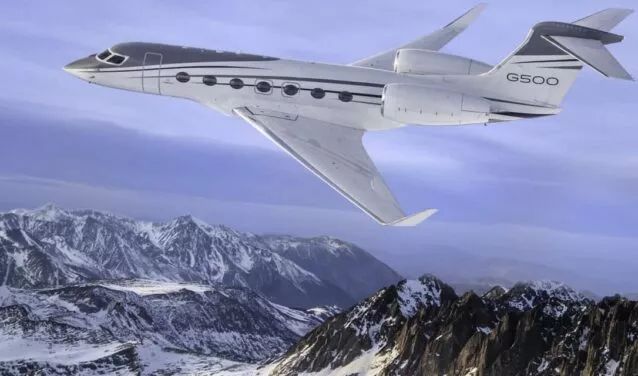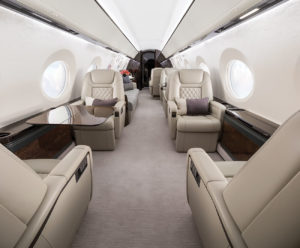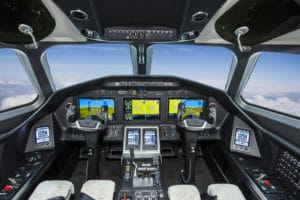
When preparing to travel by plane, it’s not uncommon to slip a sweater into your hand luggage. The interior of this means of transport is always very cool, even in summer. This constant air conditioning, though sometimes uncomfortable, is essential for passenger safety and well-being.
But why is it so cold on planes? And how does the on-board ventilation system actually work?
We explain it all in this guide.

Photo credit: Gulfstream
Why is air conditioning kept on during flights?
ventilation on board an aircraft does more than just ensure a pleasant temperature. It also plays a crucial role in passenger health.
1. Continuously regenerated and purified air
Aircraft air-conditioning systems constantly renew the air inside the cabin. This renewal is essential, as dozens or even hundreds of passengers share a confined space for several hours at a time. Without ventilation, carbon dioxide would quickly accumulate, making the air unbreathable.
2. A barrier against the spread of disease
Contrary to common myth, air conditioning on a plane doesn’t make you sick – quite the contrary. Thanks to HEPA (High Efficiency Particulate Air) filters, over 99.95% of particles, including viruses and bacteria, are eliminated from the air. Cabin air is thus comparable to that in a hospital environment, renewed every 2 to 3 minutes.
3. Vital comfort at high altitude
At altitude, atmospheric pressure drops, which can lead to hypoxia (lack of oxygen) in some passengers. Maintaining a stable, cool temperature helps limit the risk of in-flight discomfort. Ventilation is therefore also a safety measure.
How does an aircraft’s ventilation system work?
The aircraft ventilation system is a complex technology, designed to provide quality air under extreme conditions.
1. A system adapted to the size of the aircraft
The number of air-conditioned zones depends on the type and size of the aircraft. The larger the aircraft and the longer the flight, the more sophisticated the system. Modern private jets, such as Gulfstreams or Falcons, have several control zones to adapt the temperature to individual needs.
2. The role of HEPA filters
HEPA filters trap airborne particles such as viruses, bacteria, dust and pollen. The cabin air is therefore recycled, on average, every three minutes. In fact, 10-50% of the air passes through the system 20-30 times every hour.
3. Humidification and comfort
The air at altitude is very dry. To prevent dehydration and provide better respiratory comfort, the ventilation system slightly humidifies the air. This also creates a natural barrier against germs.

Photo credit : Cessna
Airplane ventilation systems: a lesson learned from the health crisis
The COVID-19 pandemic, although now behind us, has profoundly changed our perception of the air we breathe, particularly on planes. It has highlighted the importance of a good in-flight ventilation system, both for passenger comfort and health safety.
- Air quality comparable to that in hospitals
As mentioned above, modern aircraft are equipped with HEPA (High Efficiency Particulate Air) filters that capture up to 99.95% of airborne particles, including viruses, bacteria and other pathogens.
The air on board is thus renewed every 2 to 3 minutes, guaranteeing a quality close to that of operating theatres. This technology, already available long before the pandemic, has proved its worth and remains a pillar of air comfort today.
- Greater post-COVID awareness
Since the health crisis, passengers have become more aware of the quality of the air they breathe in flight. This has prompted airlines and private jet operators to reinforce their hygiene protocols and maintain optimal ventilation during all phases of the flight.
- Private aviation, still acclaimed for its health safety
Even after the pandemic, many travelers continue to favor private jets for their peace of mind and safety.
The reduced number of passengers on board, the possibility of getting to know one’s fellow passengers and the reinforced disinfection procedures make private flights a reassuring option, particularly for sensitive or immunocompromised people.
Why rent a private jet with AEROAFFAIRES?
Since 1991, AEROAFFAIRES has been providing travelers with private jets of the highest safety and comfort standards.
- 20,000 aircraft available
- Over 40,000 flights operated
- 120,000 passengers carried
- Average rating: 4.9/5
- 100% carbon offset with our SkyCO2 program
Thanks to our expertise, we guarantee you a tailor-made flight experience, adapted to your needs and in the best sanitary conditions.
Contact our aviation experts 24/7
Our specialists are available at all times to organize your private flight in the best possible conditions, and are at your service 24/7 at +33 (0) 1 44 09 91 82. Don’t hesitate to visit our online quote to obtain a price estimate for your private flight.


